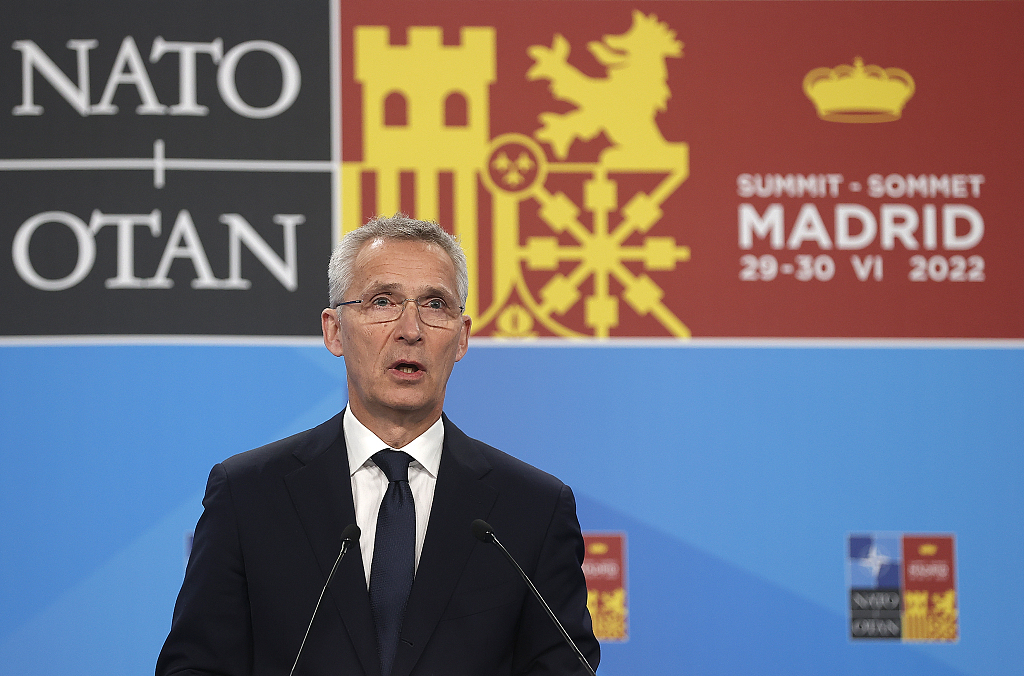
Heads of state and government pose for the official group photo during the NATO summit at the IFEMA congress center in Madrid, Spain, June 29, 2022. /CFP
Heads of state and government pose for the official group photo during the NATO summit at the IFEMA congress center in Madrid, Spain, June 29, 2022. /CFP
Editor's note: John Wight is a writer and political commentator. He is the author of Edinburgh Trilogy. He has also written a memoir Dreams That Die, telling his experience of Hollywood and participation in the U.S. antiwar movement in the run-up to the war in Iraq. The article reflects the author's opinions and not necessarily the views of CGTN.
73 years ago, North Atlantic Treaty Organization (NATO), a Western military alliance emerged from the womb of the Cold War with objectives devised by a postwar Truman administration that had fanatical hawks, consumed with the goal of full-spectrum dominance.
In the process, a radical shift took place, under which Moscow went from indispensable ally in the war against Nazi Germany to implacable foe. What ensued was the Cold War, during which the very real risk of nuclear Armageddon, involving both contending blocs extending themselves in acquiring evermore powerful and destructive nuclear arsenals, becaming normalized.
In truth, the Cold War never really ended with the demise of the Soviet Union. It merely shifted emphasis as Washington has sought to keep what was now the Russian Federation weakened and accepting of its new status of defeated foe. In this respect, NATO maintained its relevancy not so much as a shield to protect democracy, but as a sword to advance U.S.-led Western hegemony.
It is by now no secret that former U.S. Secretary of State James Baker assured then Soviet leader Mikhail Gorbachev in a meeting on February 9, 1990, that NATO would not expand "one inch eastward" upon the reunification of Germany.
According to declassified documents, Baker's pledge was made as part of a "cascade of assurances" over Soviet security given by Western leaders at that time and on into 1991, when the Soviet Union came to an end. It is the breaking of those assurances that lies at the heart of the deterioration in relations between East and West that has taken place since, and which informs the current crisis and conflicts related to Ukraine as these words are being written.
Flush with triumphalism over the demise of the Soviet Union in the early 1990s, NATO was loosed upon the world not in the name of democracy but in the cause of imperialism. New York Times columnist Thomas Friedman wrote openly of the driving ethos of Western foreign policy after the Soviet Union's demise as a drive to cement U.S. domination over the world's natural resources and markets.
Friedman's unabashed celebration of the economic opportunities lying open to the U.S. in the post-Soviet world was shared by power brokers in Washington on both sides of the aisle. Intoxicated with a misplaced sense of exceptionalism and virtue, the world now lay before Washington like a vast banquet upon which it was invited to feast. The first course in this feast was Yugoslavia, which with its abundant human and natural resources, not to mention its strategic location in the Balkans, was deemed ripe for the taking.

NATO Secretary General Jens Stoltenberg addresses a press conference on the second and final day of the NATO 2022 Summit at the IFEMA Trade Fair Center, in Madrid, Spain, June 30, 2022. /CFP
NATO Secretary General Jens Stoltenberg addresses a press conference on the second and final day of the NATO 2022 Summit at the IFEMA Trade Fair Center, in Madrid, Spain, June 30, 2022. /CFP
Michael Parenti, in his definitive work on the destruction of Yugoslavia, "To Kill a Nation," points out that after the fall of communism in eastern Europe "the Federal Republic of Yugoslavia (FRY) remained the only nation in that region that would not voluntarily discard what remained of its socialism and install an unalloyed free market system. It also proudly had no interest in joining NATO."
The decisive role of NATO in achieving the West's objectives in the Yugoslavia need not detain us. The point is that today – bearing in mind NATO's role in the dismemberment of Yugoslavia, its role in helping turn Afghanistan into a war-worn state, its critical role in toppling Muammar Gaddafi in Libya and turning that country into a chaotic place, and its stance in threatening Russia's security in Eastern Europe – it is no longer feasible or possible to harbor any lingering belief that NATO is anything other than a tool of U.S. hard power, deployed not to protect and defend, but to destroy and dominate.
Whenever you hear Joe Biden and other leaders and officials of NATO member states pontificating about the verities of security and stability in our world, it is notable that none advocate for the one thing that would not only end the bitter conflict in Ukraine, but do much to restore that stability and security to a world that has long been desperate for both.
That one thing is NATO's disbandment and the embrace of a multipolar alternative to the unipolar world that has proved the harbinger of grievous instability, conflict and chaos.
In the last analysis, if the decades since the demise of the Soviet Union has confirmed one thing above all else, it is that the overriding challenge facing humanity is not the lack of democracy within states, but the lack of democracy between states. Until the latter is achieved the former will always remain a victim of the asphyxiating effects of hegemony and unipolarity.
(If you want to contribute and have specific expertise, please contact us at opinions@cgtn.com. Follow @thouse_opinions on Twitter to discover the latest commentaries in the CGTN Opinion Section.)

